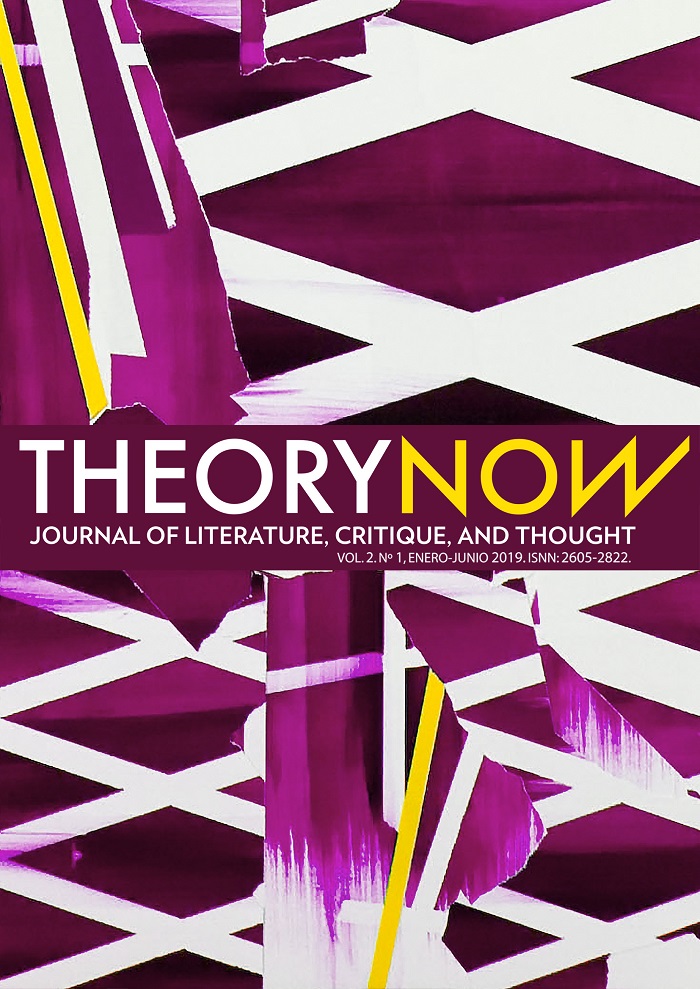Martin jay: un retrato intelectual
DOI :
https://doi.org/10.30827/tnj.v2i1.8624Mots-clés :
Martin Jay, Teoría crítica, Estudios visuales, Negatividad, Parresía, PostsecularismoRésumé
La siguiente entrevista se realizó el 6 de junio de 2018 en el marco del ciclo de entrevistas “El intelectual y su memoria” de la Facultad de Filosofía y Letras de la Universidad de Granada. A lo largo de la entrevista, Jay reflexionó acerca de su carrera intelectual, el estado actual de la teoría crítica y de las categorías dialécticas, el estatus de la verdad hoy en día, el postsecularismo y las políticas identitarias.Téléchargements
Références
Adorno, Theodor W. Negative Dialektik. Frankfurt, Suhrkamp, 1966.
_____. Ästhetische Theorie. Frankfurt, Suhrkamp, 1970.
_____. Minima Moralia. Translated by Dennis Redmond. London, Verso, 2005.
Geroulanos, Stefanos. Transparency in Postwar France. A Critical History of the Present. Stanford, Stanford University Press.
Habermas, Jürgen. Philosophical-Political Profiles. Translated by Frederick G. Lawrence. London, Heinemann, 1983.
_____. Die Neue Unübersichtlichkeit. Frankfurt, Suhrkamp, 1985.
Hitchens, Christopher. No One Left to Lie To: The Triangulations of William Jefferson Clinton. New York, Verso, 1999.
Horkheimer, Max. “Foreword”, in The Dialectical Imagination: A History of the Frankfurt School and the Institute of Social Research, 1923-50, by Martin Jay. Berkeley and Los Angeles, University of California Press, 1996.
Howard, Dick and Karl E. Klare. The unknown dimension: European Marxism since Lenin. New York, Basic Books, 1972.
Hughes, H. Stuart. Consciousness and Society: The Reorientation of European Social Thought. Cambridge, Harvard University Press, 1958.
_____. The Sea Change: The Migration of Social Thought, 1930-1965. New York, Harper & Row, 1975.
Inglorious Basterds. Directed by Quentin Tarantino. Universal Pictures, 2009.
Jay, Martin. The Dialectical Imagination: A History of the Frankfurt School and the Institute of Social Research, 1923-50. Berkeley and Los Angeles, University of California Press, 1973.
_____. Adorno. Cambridge, Harvard University Press, 1984.
_____. Marxism and Totality: The Adventures of a Concept from Lukács to Habermas. Berkeley and Los Angeles, University of California Press, 1984.
_____. Downcast Eyes: The Denigration of Vision in Twentieth-Century French Thought. Berkeley and Los Angeles, University of California Press, 1993.
_____. Songs of Experience: Modern American and European Variations on a Universal Theme. Berkeley and Los Angeles, University of California Press, 2004.
_____. “Visual Parrhesia? Foucault and the Truth of the Gaze”. A Time for the Humanities: Futurity and the Limits of Autonomy, edited by James J. Bono et al. New York, Fordham University Press, 2008, pp. 45-58.
_____. The Virtues of Mendacity: On Lying in Politics. Charlottesville, University of Virginia Press, 2010.
_____. Reason After its Eclipse: On Late Critical Theory. Madison, University of Wisconsin Press, 2016.
_____. “Can Photographs Lie? Reflections on a Perennial Anxiety,” Critical Studies, 2, September 2016, pp. 6-19.
Marcuse, Herbert. Eros and Civilization. Boston, Beacon Press, 1955.
_____. One-Dimensional Man. Boston, Beacon Press, 1964.
Keesling, Jamie and Spencer A. Leonard. “Critical Theory, Marxism, social evolution: An interview with Martin Jay”. Platypus Review, 83, 2016, https://platypus1917.org/2016/01/30/critical-theory-marxism-social-evolution-an-interview-with-martin-jay/. Accessed 21 December 2018.
Williams, Bernard. Truth and Truthfulness An Essay in Genealogy. Princeton, Princeton University Press, 2002.
Téléchargements
Publié-e
Comment citer
Numéro
Rubrique
Licence
Theory Now Journal of Literature, Critique, and Thought est une publication d’accès ouvert, immédiat et totalement gratuit pour les lecteurs autant que les auteurs. Les auteurs ne payent aucun frais pour le processus éditorial de leurs articles. Nous permettons la lecture, le téléchargement, la copie, la distribution, l’impression, la recherche, le lien ou la réutilisation de tous les travaux publiés à des fins non commerciales, à condition que l’auteur, la revue et l’entité éditoriale soient cités. La diffusion des articles dans les réseaux sociaux (Facebook, Twitter, LinkedIn, etc.) et scientifiques (ResearchGate, Academia.edu, etc.), les dépôts institutionnels universitaires et autres dépôts publics, blogs et web personnels ou institutionnels, Google Scholar, ORCID, ResearchID, ScopusID, etc., est vivement recommandée. Dans tous les cas, la propriété intellectuelle des articles et les possibles droits économiques dérivés d’eux sont conservés exclusivement par leurs auteurs.













